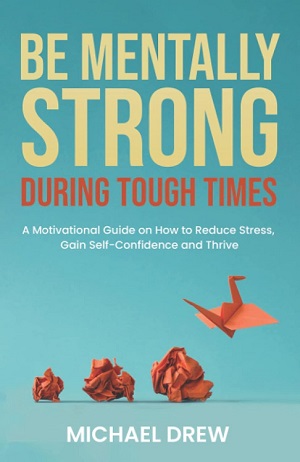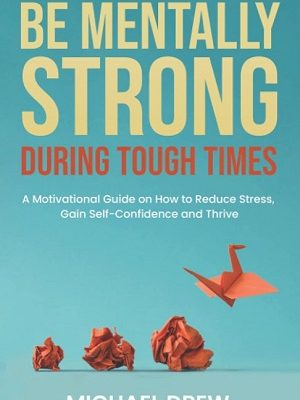Be Mentally Strong During Tough Times: A Motivational Guide on How to Reduce Stress, Gain Self-Confidence and Thrive by Michael Drew is a powerful and insightful guide designed to help individuals navigate life’s most challenging moments with resilience and determination. Drew focuses on practical strategies to build mental toughness, manage stress, and improve self-confidence, all while teaching the importance of a positive mindset and personal growth. The lessons in the book are actionable and designed for anyone looking to thrive during difficult periods. Below are the lessons:

Read: Master Your Emotions
1. Understanding Mental Strength: The Foundation of Resilience
One of the first lessons Michael Drew discusses is the importance of mental strength as the foundation of resilience. Mental strength is the ability to manage your thoughts, emotions, and behavior in ways that set you up for success. Drew emphasizes that mental strength is not about suppressing emotions but rather learning how to respond to challenges in a balanced and productive way.
- Key Insight: Building mental strength involves developing self-awareness, controlling emotional reactions, and cultivating a positive mindset, regardless of external circumstances. This helps you stay composed and make better decisions under pressure.
2. Reducing Stress Through Mindfulness and Self-care
Stress is one of the biggest obstacles to mental strength, especially during tough times. Drew teaches that reducing stress starts with mindfulness—being present and aware of your thoughts and feelings without judgment. By practicing mindfulness, you can better manage your reactions to stressful situations and prevent negative emotions from overwhelming you.
- Practical Application: Incorporate daily mindfulness practices, such as deep breathing, meditation, or journaling, to keep stress levels in check. Drew also emphasizes the importance of self-care, including getting enough sleep, maintaining a healthy diet, and regular physical activity to improve overall well-being.
3. Cultivate a Growth Mindset: Turning Challenges into Opportunities
Drew highlights the power of adopting a growth mindset—believing that you can learn and grow from challenges, rather than seeing them as insurmountable obstacles. This mindset shift allows you to embrace difficult times as opportunities for personal development and resilience.
- Action Step: Whenever you face adversity, ask yourself what lessons can be learned. Instead of focusing on the problem, focus on how overcoming it can make you stronger and more capable in the future.
4. Gain Self-Confidence by Celebrating Small Wins
Self-confidence plays a vital role in how well you handle tough times. Drew explains that self-confidence grows through consistent effort and the recognition of your achievements, no matter how small. By celebrating small victories, you can build a sense of progress and reinforce positive habits.
- Key Takeaway: Keep track of your progress by setting small, achievable goals, and reward yourself for reaching them. This not only boosts self-confidence but also creates momentum that helps you tackle larger challenges.
5. Avoid Negative Thinking Patterns
One of the key lessons Drew teaches is the importance of avoiding negative thinking patterns, such as catastrophizing (assuming the worst) and black-and-white thinking (seeing situations as all good or all bad). These thought patterns can intensify stress and erode mental strength.
- Advice: Challenge negative thoughts by asking yourself whether they are based on facts or assumptions. Reframe your thoughts to focus on solutions rather than dwelling on problems. Drew suggests practicing positive self-talk and surrounding yourself with positive influences.
6. The Importance of Emotional Regulation
Emotional regulation is essential for mental strength. During tough times, emotions like fear, anger, and frustration can easily take over. Drew teaches that learning to regulate these emotions, rather than letting them control you, is key to maintaining resilience.
- Practical Tip: When you feel overwhelmed by emotion, take a step back, breathe deeply, and assess the situation logically. Focus on calming yourself before reacting, so you can make rational decisions. Techniques like progressive muscle relaxation or visualization can also help calm intense emotions.
7. Building a Support System: Don’t Go It Alone
One of the most important lessons in the book is the value of building a support system. Mental strength isn’t just about handling everything on your own—it’s also about knowing when to seek help and lean on others. Drew emphasizes the importance of having a network of supportive friends, family, or mentors who can provide encouragement, perspective, and advice.
- Action Step: Reach out to trusted individuals during difficult times. Be open about your struggles and ask for support when needed. Drew also suggests finding a mentor or joining a community of like-minded individuals to foster mutual support and accountability.
8. Embrace Uncertainty: Thriving Amid Change
Drew teaches that uncertainty is an inevitable part of life, and learning to embrace it rather than fear it is crucial for mental strength. Resisting change or uncertainty only increases stress and anxiety. Instead, view change as an opportunity for growth and new experiences.
- Key Insight: Cultivate flexibility and adaptability by accepting that not everything is within your control. Focus on what you can control—your response to change. By staying open to new possibilities, you can turn uncertainty into an advantage.
9. The Power of Resilience: Bouncing Back from Failure
Failure is often seen as something negative, but Drew reframes failure as a necessary step toward success. Resilience is the ability to bounce back from setbacks and continue moving forward. Mentally strong people view failure as feedback, not a permanent condition.
- Practical Application: After a failure or setback, take time to reflect on what went wrong and what you can do differently next time. Use these insights to adjust your approach, and don’t be afraid to try again. Persistence is key to building resilience.
10. Develop Mental Toughness Through Discipline
Mental toughness is closely linked to discipline—the ability to stay committed to your goals even when faced with difficulties. Drew teaches that discipline helps you stay focused on your long-term objectives, especially when motivation wanes or obstacles arise.
- Pro Tip: Build discipline by creating a daily routine that includes small, consistent actions toward your goals. Break down big goals into manageable tasks and prioritize them. The more disciplined you are, the less likely you’ll be derailed by challenges.
11. Managing Fear: Turning Fear into Fuel
Fear is a natural reaction to tough times, but Drew teaches that it doesn’t have to paralyze you. Instead, you can harness fear as motivation. Rather than avoiding or suppressing fear, face it head-on, acknowledge it, and use it as fuel to propel you forward.
- Key Lesson: When you feel fear, ask yourself what specifically you’re afraid of and whether that fear is rational. Then, break the fear down into smaller, manageable parts and take action. Each small step will reduce fear’s hold over you.
12. Cultivating Gratitude During Tough Times
Gratitude is a powerful tool for maintaining a positive outlook, even during difficult times. Drew explains that gratitude helps shift your focus from what’s going wrong to what’s going right. It also improves emotional well-being by promoting feelings of happiness and contentment.
- Action Step: Practice daily gratitude by writing down three things you are thankful for each day, even during tough times. This simple habit can help shift your perspective and remind you of the positives in your life, no matter how small.
13. Overcoming Self-doubt: Building Unshakable Confidence
Self-doubt can undermine mental strength, especially when faced with challenges. Drew teaches that overcoming self-doubt is essential for achieving success and maintaining resilience. Confidence comes from recognizing your worth, abilities, and past achievements.
- Practical Advice: Combat self-doubt by reminding yourself of your past successes and strengths. Set small, achievable goals to build your confidence incrementally. Affirmations and positive self-talk can also help replace doubt with self-belief.
14. Setting Boundaries: Protecting Your Mental Energy
Drew emphasizes the importance of setting boundaries to protect your mental and emotional well-being. Without boundaries, you can easily become overwhelmed by others’ demands and lose focus on your own needs. Setting clear boundaries helps you preserve your mental energy and stay focused on what’s important.
- Pro Tip: Learn to say no to requests or obligations that don’t align with your priorities. Be firm but respectful when setting boundaries with others, and don’t feel guilty for protecting your time and energy.
15. Living with Purpose: Find Meaning in Adversity
A key lesson from Drew is the idea that having a sense of purpose can make tough times more bearable. When you have a clear purpose, you’re more likely to persevere through challenges because you understand the bigger picture. Finding meaning in adversity gives you the motivation to keep going.
- Key Insight: Reflect on your core values, passions, and long-term goals. Use tough times as an opportunity to align your actions with your purpose. When you’re clear on your “why,” it becomes easier to navigate obstacles and setbacks.
Conclusion
Be Mentally Strong During Tough Times by Michael Drew offers practical and motivational lessons for anyone facing adversity. By focusing on mental strength, emotional regulation, self-confidence, and resilience, Drew provides readers with the tools to thrive during challenging periods. Whether it’s reducing stress through mindfulness, embracing uncertainty, or gaining self-confidence through small wins, the strategies in this book can be applied to everyday life for personal growth and success (Amazon).



